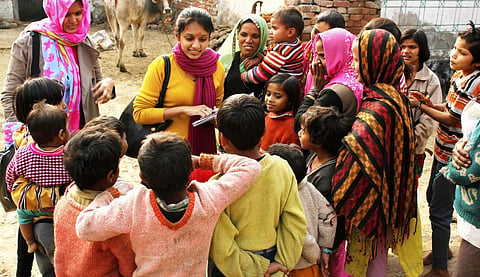World NGO Day: Role of partnerships in building an inclusive, resilient post-pandemic India
India has over three million non-governmental organisations (NGO) that work across a range of arenas and play important roles of facilitator, catalyst or partner in bringing social transformation.
In the present scenario, when India is still combating COVID-19, non-fprofits have been on the ground, working tirelessly to directly supplement the government’s efforts to bring relief and actively engage in vaccination drives to the most vulnerable communities.
The central government gives a great thrust to NGOs that promote the country’s development. There have been many instances when NGOs have played an essential role in the development of India as a nation.
These NGOs also look into accelerating activities like issues dealing with poverty alleviation, water, environment, women’s rights and literacy. In the past decades, there has been significant growth in areas where NGOs have been active. They have been dynamic in almost all sectors: Health, education, livelihood in rural and urban areas to name a few.
Another major achievement of NGOs includes influencing the Indian government to formulate various developmental laws and policies, which include Right to Information, Mahatma Gandhi National Rural Employment Guarantee Act (MNREGA), Juvenile Justice and Integrated Child Protection Scheme (ICPS). NGOs also partnered with the government to successfully implement major campaigns like Swachh Bharat Abiyaan and Sarva Siksha Abiyaan.
NGOs have always been on the forefront, taking accountability by offering multiple solutions for development. During the pandemic, NGOs played a pivotal role and supported the government’s COVID-19 response initiative full-fledged. Given their grassroots presence and solid community relations, local NGOs played a very important role in accelerating vaccination drives and encouraging communities to practice COVID-19 protocols.
Many NGOs tweaked their existing development programmes to suit the needs of the pandemic as well as the community context. They had adjusted their strategies to align with the needs supporting governments at district and state levels.
All these factors placed NGOs in a unique position unlike government programmes that have a ‘one size fits all’ approach. Seeing the positive response, Prime Minister Narendra Modi also encouraged government officials to involve NGOs in their efforts to reach out to people.
Finally, NGOs stepped in where governments couldn’t, and provided services that governments do not. As the impacts of the COVID-19 pandemic continue to unfold, differentiated effects are becoming clear.
Even though we do not yet know how the pandemic will play out over the coming years, it is clear that it is much more than a health crisis. Its impacts and complexities are multi-dimensional and present wide-ranging social, economic and environmental challenges for the communities in all corners of the country.
As the future for post COVID-19 India still looks uncertain and volatile, let’s agree that the work of NGOs will be paramount for the society’s most vulnerable populations.
India played a prominent role in the formulation of the United Nations Sustainable Development Agenda 2030 and much of the country’s National Development Agenda is linked to achieving the United Nations-mandated Sustainable Development Goals.
India now ranks 120 out of 162 on the SDG Index. Sustainable development goals (SDG) refer to 17 interlinked global goals set by the United Nations General Assembly in 2015.
Before the pandemic, SDGs were readily embraced and the nation had set ambitious targets for implementation by aligning them with the national development agenda.
Unfortunately, the onset of the COVID-19 pandemic significantly impeded advancements in sustainability and derailed India's journey to fulfilling SDGs as planned. This slow progress in the post COVID phase calls for immediate action through a collaboration between the corporate sector, NGOs and the government.
Building better amid the pandemic requires concerted efforts from all stakeholders, including the government, private sector, public sector undertakings and NGOs. Corporate social responsibility (CSR) backing to NGOs are seen as key drivers to achieve SDGs during the pandemic and India Inc as the money to fund innovations.
The pandemic has spurred corporations to protect lives, livelihoods and the environment. The pandemic has also given corporate India a chance to reflect and realign priorities to help the underserved through CSR programs that have relevance, impact and scale.
NGOs need to use this opportunity and bridge the gap. With their field knowledge, proven development models and funds from CSR partnerships, the road to post-COVID recovery would build a more inclusive, sustainable and resilient India.
This fight against COVID-19 has been a collaborative effort. And the way in which governments, corporates and non-government organisations have responded to the pandemic reinforces the power of partnerships.
The pandemic has been a phase of learning for all in understanding the gaps in our society. The efforts taken by all is a testament to the collective articulation of social responsibility towards the citizens of the country. The pandemic is and will be a challenge and cannot be addressed until all stakeholders come together.
India is committed to SDGs till 2030 and a long-term strategy is important to keep the focus while also pursuing sustainable growth and development. It is, however, important to note that success of a long-term strategy depends not only on the lessons learnt from implementing the short- or medium-term development strategies, but also cooperation and coordination from various sectors — the government, India Inc and NGOs.
Considerable commitment, solidarity and funding is required to reprioritize our agendas across all levels of society, as this is the key to build back the nation for better.
Sony Thomas is Group Director - Resource Mobilisation and Public Engagement (RMPE), World Vision India
Views expressed are the author’s own and don’t necessarily reflect those of Down To Earth


